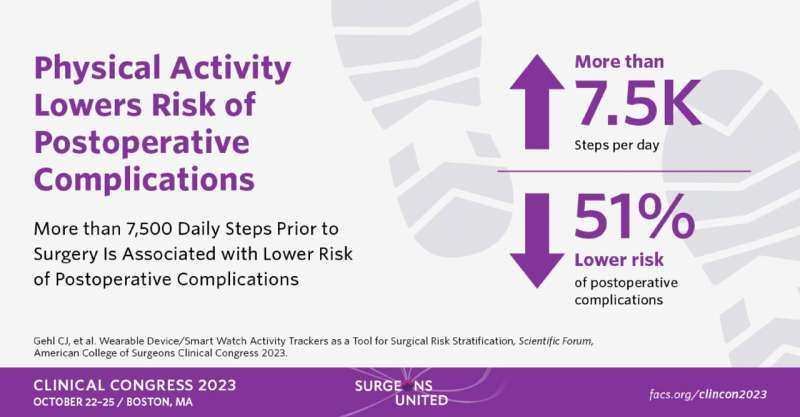This article has been reviewed according to Science X's editorial process and policies. Editors have highlighted the following attributes while ensuring the content's credibility:
fact-checked
trusted source
proofread
More than 7,500 daily steps prior to surgery is associated with lower risk of postoperative complications

Patients who recorded more walking activity prior to surgery, regardless of complexity of the operation or their health status, showed 51% reduced odds for postoperative complications than less active patients, according to research findings being presented at the American College of Surgeons (ACS) Clinical Congress 2023.
Postoperative complications typically occur in about 30% of patients, and about half of all complications occur after the patient leaves the hospital.
"Fitbits and other wearable devices could potentially be linked to Electronic Health Records (EHRs) and have that data be something that surgeons consider when planning perioperative care for their patients," said lead study author Carson Gehl, a second-year medical student at the Medical College of Wisconsin in Milwaukee. "This could really come to fruition to improve postoperative outcomes."
Researchers analyzed health data for 475 people participating in the All of Us Research Program—a National Institutes of Health-sponsored program focusing on the relationship between lifestyle, biology, and environment in diverse populations—who used a Fitbit device, worn like a watch, that measured their daily steps. This is the only population-level study to explore the association between physical activity, as measured by a Fitbit, and 90-day postoperative complications, according to the study authors.
"We used the combination of EHRs and Fitbit data to uncover how to potentially improve surgical outcomes. In our study, we looked at how many steps patients recorded on any given day, which is a proxy for physical activity," Gehl said.
"However, the fitness data wasn't limited to the immediate preoperative period. The length of their activity record could be six months or several years before surgery. This is more reflective of chronic physical activity habits, versus the physical activity in the immediate preoperative period."
Participants underwent a wide range of operations, including general surgery, orthopedic surgery, and neurosurgery, and were an average age of 57 years old. Women comprised 74.7% of participants, and 85.2% of participants were white.
Key findings
- About 12.6% of study participants experienced a complication within 90 days of surgery.
- The odds of experiencing a complication within 30 days after surgery were 45% less (odds ratio 0.55) if patients took more than 7,500 steps per day prior to surgery than if their Fitbit recorded fewer than 7,500 steps.
- After adjusting for comorbidities, BMI, sex, race, and complexity of the operation, the odds of experiencing a complication were 51% lower (odds ratio 0.49) if patients had Fitbit data showing they had walked more than 7,500 steps per day before surgery.
"If we find people who are at high risk, using these Fitbit tools, we could monitor them more closely following their procedure because that allows us to catch problems before they progress beyond control," Gehl said. "Another goal of our research is to modify physical activity in the preoperative period and improve postoperative outcomes. We need more studies and evidence to answer that question."
A limitation of the study was that available Fitbit data came from a less diverse group of patients. Fitbit is a device worn like a watch to self-track sleep, physical activity, and heart rate data. Study participants had to have their own Fitbit device, which limits the generalizability of the study results.
Study co-authors are Nathaniel B. Verhagen; Tahseen Shaik; Xin Yang, Ph.D.; Bradley W. Taylor; Ugwuji N. Maduekwe, MD, FACS; and Anai Kothari, MD, MS.
More information: Gehl CJ, et al. Wearable Device/Smart Watch Activity Trackers as a Tool for Surgical Risk Stratification, Scientific Forum, American College of Surgeons (ACS) Clinical Congress 2023.
















